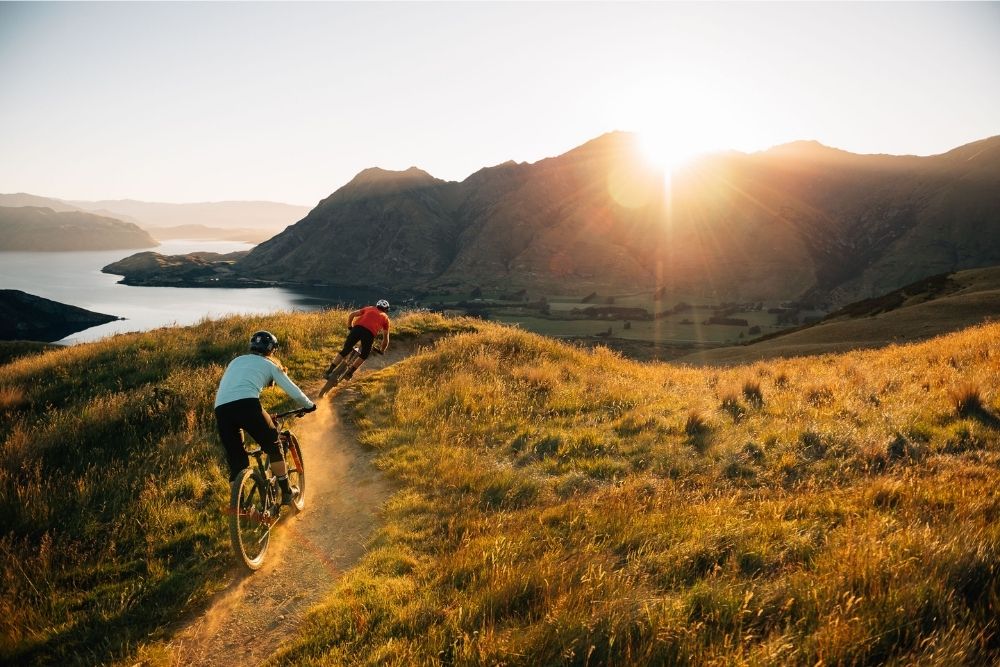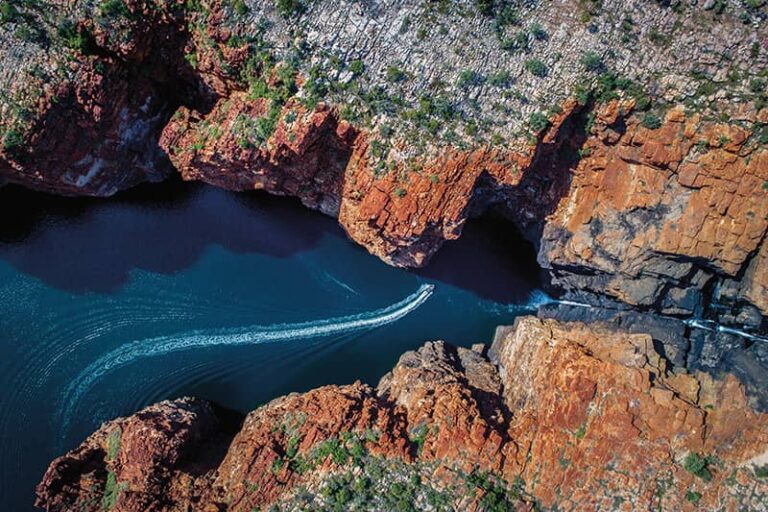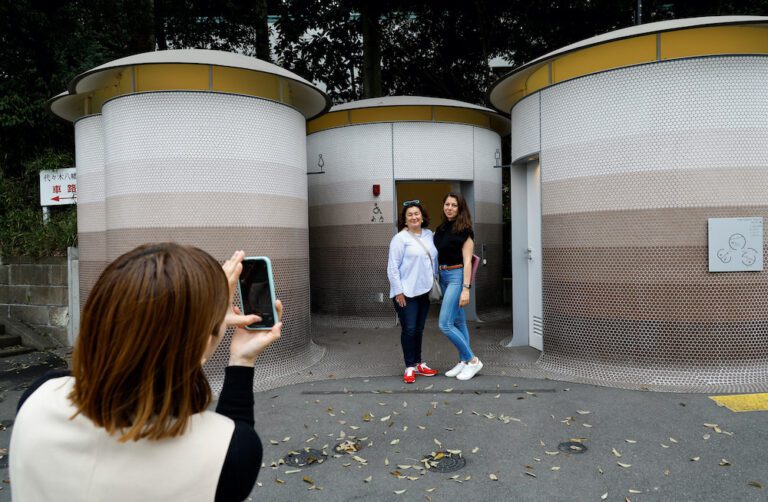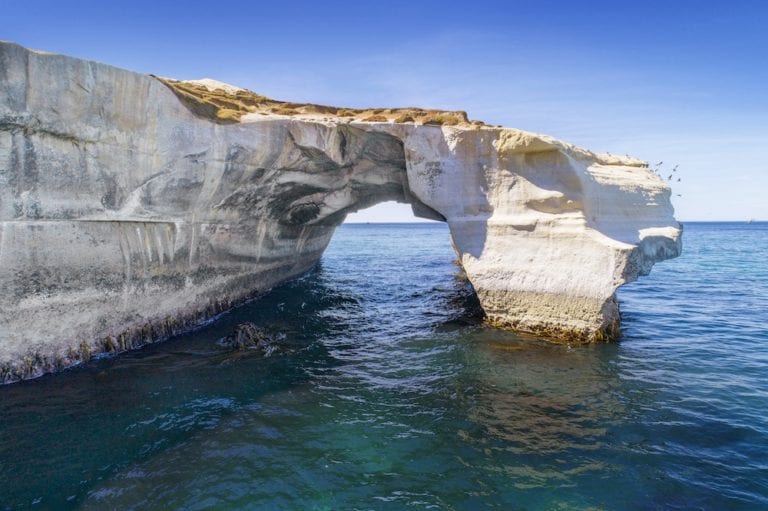Avid explorers and wilderness wanderers have long been drawn to the lakeshores and alpine peaks of New Zealand’s Wānaka region. Māori summer campsites, known as ‘kainga’, were the first signs of human settlement here, dotted around the crystal-clear lakes.
By the 1860s, English prospectors flocked to the region, hoping to strike rich during the gold rush, and later, thrill-seeking adventurers daring to conquer its mighty mountains arrived. The spirit of these explorers remains in the small Wānaka community today, with people forging deep connections to the place they now call home and a new generation of businesses committed to preserving the land for the future.
Bike Glendhu is Wānaka’s first purpose-built mountain bike park, opened at the beginning of 2020. It is the brainchild of farmer John McRae and health and wellness expert John Wilson. The stunning bike park boasts an incredible network of mountain trails for two-wheeled explorers. Evelyn Vallillee and Jesse Herbert run Bike Glendhu’s food hub, Velo Cafe, focusing on fast, healthy, ‘approachable’ wholefoods that challenge the status quo for most adventure park food.
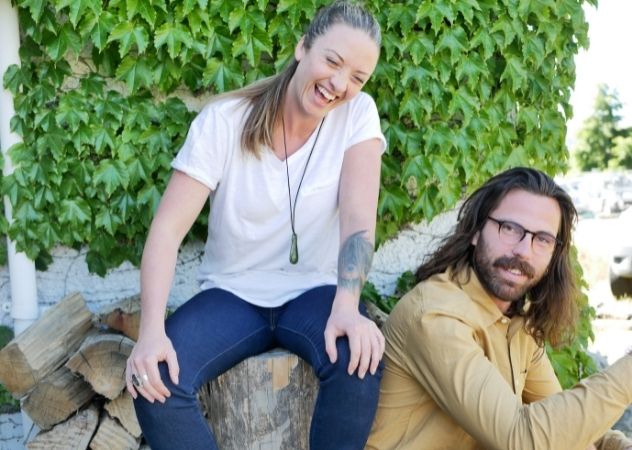
Love for landscape
A respect for the environment is embedded in their practices. Both the bike park and café are powered by solar panels and the water is sourced from Glendhu Station. “We don’t do takeaway coffee cups. Rather we offer sit-in or ‘Wanakup’, a cup exchange program that has proven to be very successful in our small town of Wānaka,” says Herbert.
“All items that require packaging in the café are 100 per cent recyclable or home compostable. We’ve built a four-bay composting system so everything (food waste, packaging, etc.) is reduced to soil on-site. We use this soil each year for our garden beds to grow garnishing herbs and flowers.”
Love for landscape runs deep in the community, as does a welcoming attitude towards those who come to visit. Nestled amongst rows of trees and looking out towards snow-capped mountains is The Camp, a lakeside accommodation that offers tents and powered sites, cabins, cottages, holiday houses, glamping villages and a tiny house.
“It’s the high country hospitality we deliver that is so special about our place. We treat everyone who comes here like a mate and ensure that they leave feeling like one. No matter what accommodation type they choose,” says General Manager Tom Gerlach.
“We are busy organising a community day at The Camp where we will invite the locals to re-engage with our space, whether that be to stay in one of our accommodation options or eat and drink at our Food Truck and Bar or even just bring the kids down for a fish, walk or to play in the park. We are adamant that this special place should be enjoyed by the local community. We absolutely prioritise local suppliers from a food and beverage perspective and will ramp this up over summer as our food truck and bar start to take off.”
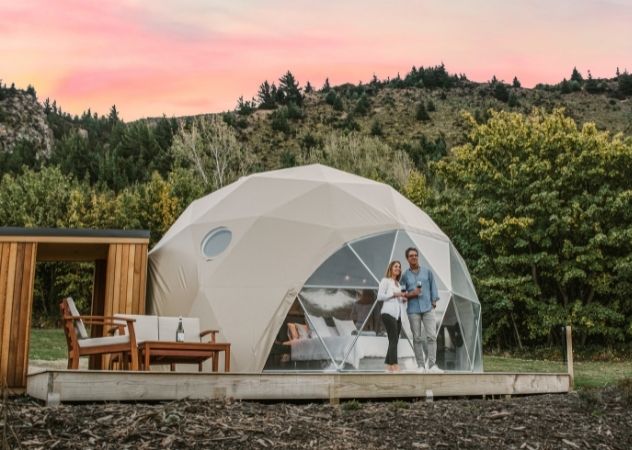
The Camp’s environmental initiatives range from chemical and single-use plastic eradication, to waste reduction and composting. “Some of our most recent initiatives include the ongoing development of a trapping line that we will utilise not only to help eradicate pests but also to educate our guests on the importance of pest eradication,” says Gerlach. “We are also building upon our composting initiative with the introduction of a chicken coop where guests and kids can feed the chooks with their compost and collect eggs.”
There is a tenacious spirit amongst the business owners in Wānaka, many of whom have made major career pivots. Lucy Conway is a lawyer-turnedcafé owner, who opened Scroggin café in January 2021. “Wānaka had always been an appealing spot to me,” she says. “The vision behind Scroggin is to purchase as local as possible and create a wholefood menu. So we make pretty much everything in house and support as many local growers and purveyors as possible. It’s bringing food back to its roots and letting the food actually speak for itself.”
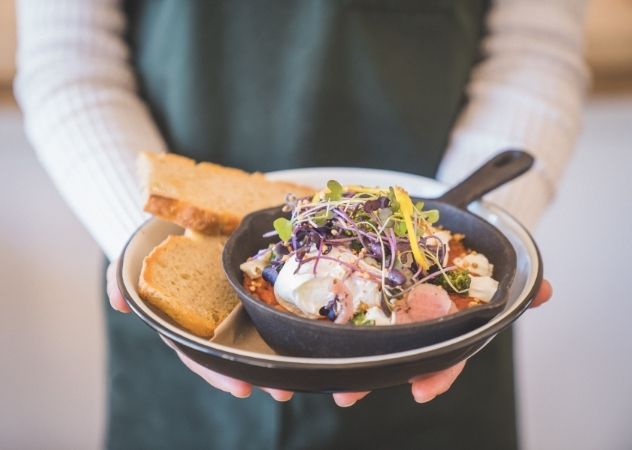
Seasonality drives the menu, sourcing produce from Basil, Parsley and Partners in Cromwell and meat from local butcher Neat Meat, which they use to make their own in-house sausages and bacon. The café plans to sell its own packaged scroggin (trail mix), granola and seed bread, as well as host events like supper clubs and poetry nights. The name of the café embodies both her love for “all things good” and Wānaka’s rugged wilderness, with the interiors – designed by local Undercurrent Studio – reminiscent of backcountry huts with natural wood and a handcrafted feel.
Says Conway: “Some of my favourite eating memories are when I’m in a backcountry hut with a bunch of friends. That’s what I wanted to replicate within Scroggin.”
Local & wholesome
Caitlin Ovenden and her husband, Max, started their small Hawea Flat farm, Wild Things Wānaka, after New Zealand’s first lockdown. Their business is built on the practices of regenerative farming, returning what once was a cattle pasture into healthy, fertile and biodiverse land providing produce to local restaurants and stores.
Wild Things runs on the ethos that everything is part of a cycle. “Chickens provide manure which gets composted, that goes to fertilising our plants, which get pulled and fed to the chickens,” says Caitlin. “By starting with the soil, using natural systems instead of chemical fertilisers to restore the soil’s fertility and growing capacity, as well as making sure we keep our biodiversity abundant around the property, we are supporting hundreds of different ecosystems both underground and above. The more we can sustain ourselves through our actions here on our farm, the more that sustainability can then spread further into our community.”
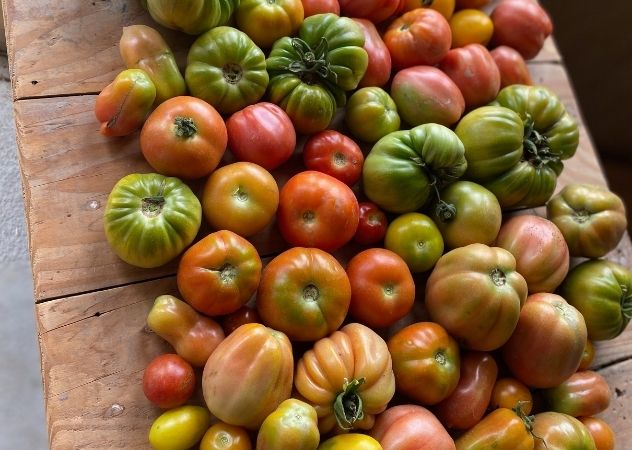
She says the interest in the provenance of food is ever-growing in the community. “We were lucky in a sense, starting up Wild Things Wānaka right after the pandemic.
“People were looking to bring things back to local, wholesome systems that they could rely on, even when everything else around them seemed a bit unreliable,” she says. “I knew that I wanted to be involved in growing food for my community and contributing to the ‘slow foods’ idea.”
She believes places like Wild Things can do more than supply food, but inspire and educate. “I loved the idea of being able to create a place where people could come and learn, feel at home and be part of what we were doing.” Their vision is to keep growing the business and eventually open up a store front, where they can sell produce alongside other growers, farmers and artisan goods.
“We are also working with a group of people centered around the food community here in Wānaka, spearheaded by Naomi Lindsay [of Forage & Feast] to start a non-for-profit charitable trust to encourage connections among the community of growers, chefs, artisan producers and sellers. This could be an amazing opportunity to grow our food economy here in Wānaka and make it more accessible to anybody wanting to be involved.”


